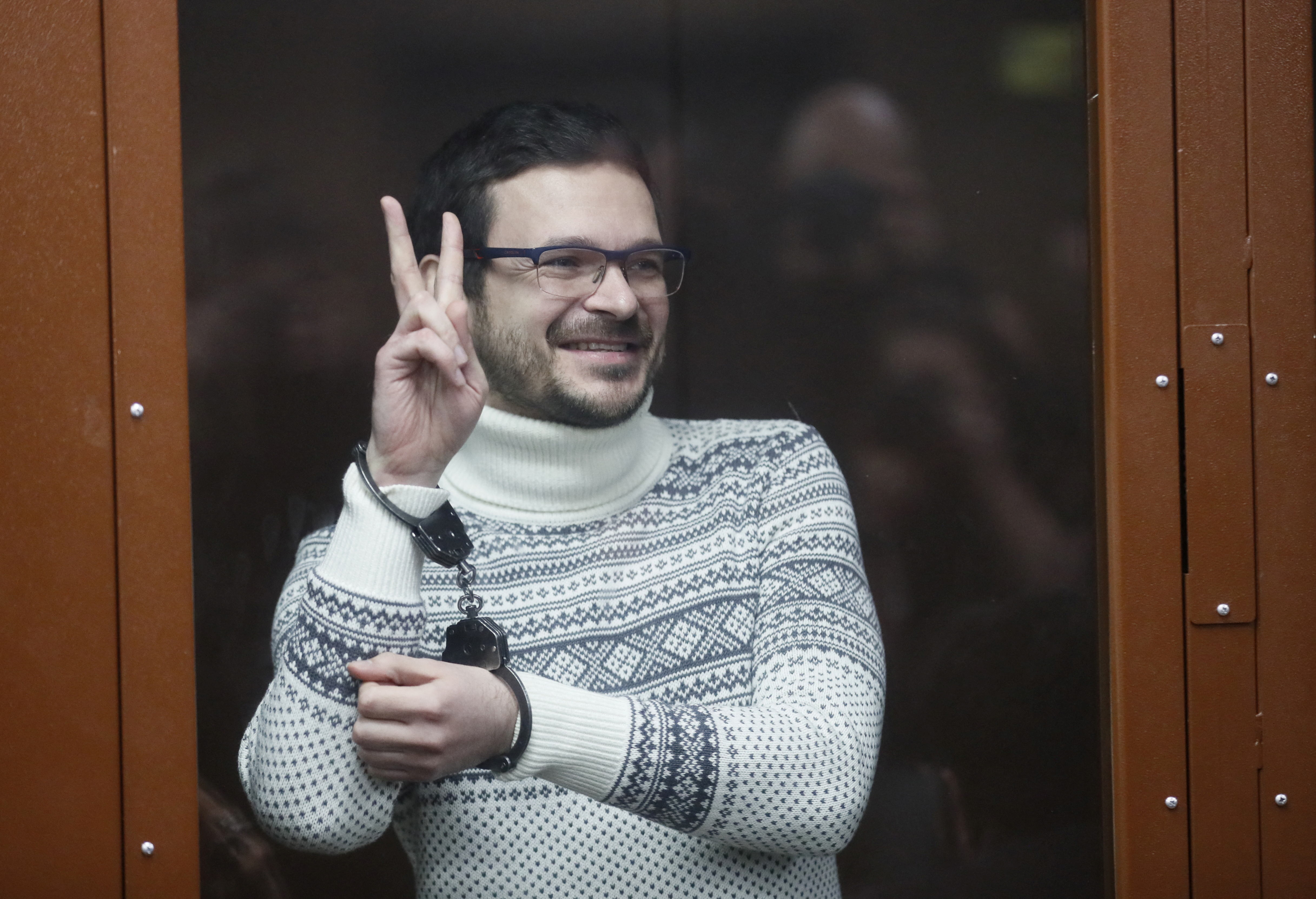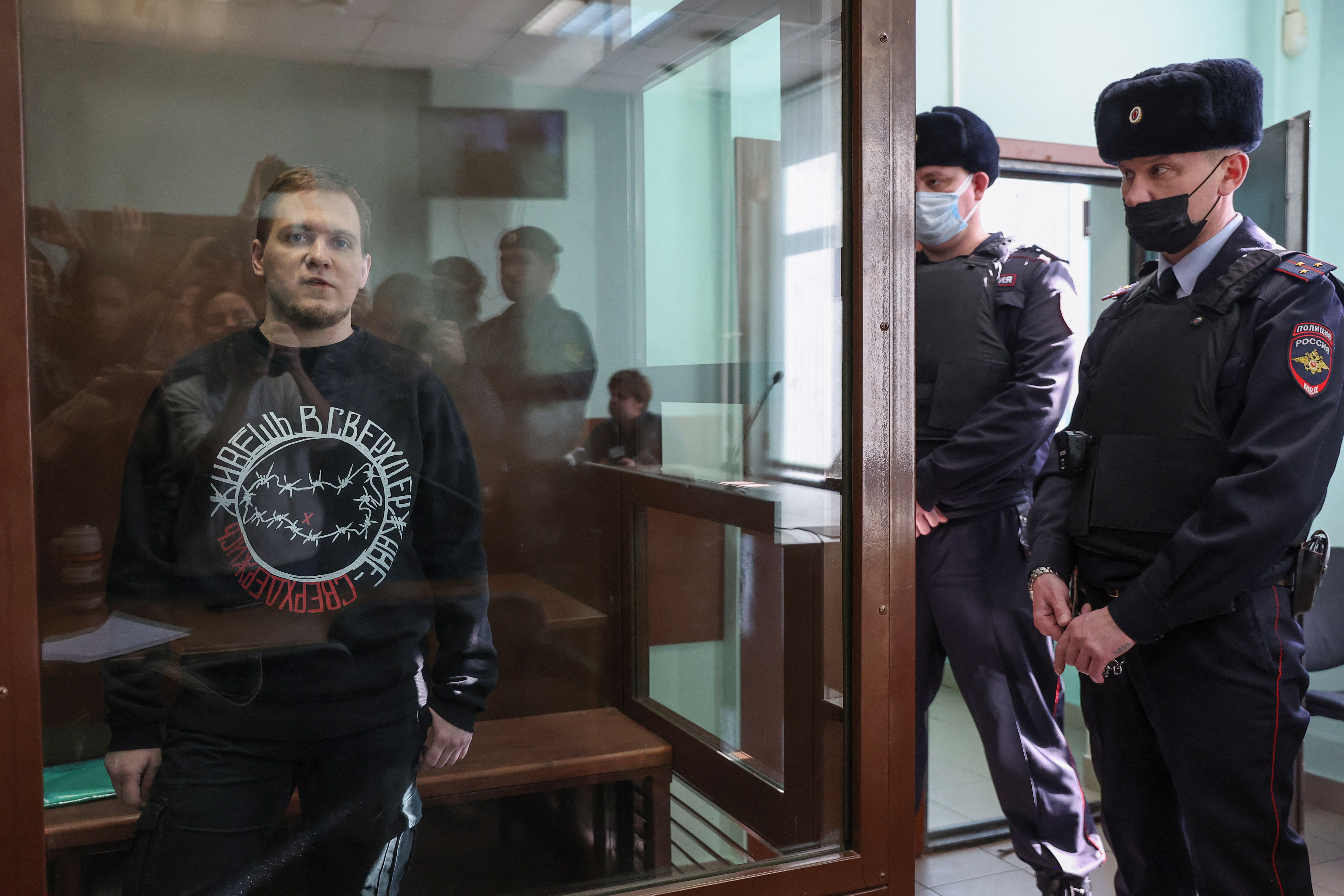
In another sign of Moscow’s punishing crackdown on those who question its war in Ukraine, the 69-year-old veteran human rights campaigner Oleg Orlov was detained this week on charges of “repeatedly discrediting the armed forces”.
If convicted, he could serve up to three years in prison.
Orlov co-chaired Memorial, Russia’s leading human rights organisation, which has chronicled abuses from the Soviet era to the present until it was outlawed two years ago. Even after its closure, the organisation, including Orlov, carried on working under a different name.
“The struggle for peace has become a crime and of course, [we] are very worried for Oleg,” Svetlana Gannushkina, a member of Memorial, told Al Jazeera.
Since Russia invaded Ukraine last year, the Kremlin has tightened the screws on critics.
According to the human rights monitor OVD-Info, at least 482 people have been charged under Russia’s strict new wartime censorship laws. Some 136 have been sent to prison.
Here, we take a look at 12 other notable cases over the past 13 months.
Alexey Gorinov: Moscow councillor who asked, ‘Do you still need this war?’

At a council meeting in March 2022, Moscow Councillor Alexey Gorinov and a fellow deputy, Elena Kotenochkina, spoke out against a proposal to hold a children’s drawing contest and dancing competition while Ukrainian “children were dying”.
Gorinov was charged with the new crime of spreading “fake news” about the war in Ukraine and was the first to be imprisoned for it. Gorinov did not plead guilty, instead holding up a sign in the dock saying: “Do you still need this war?” He was sentenced to seven years.
Kotenochkina escaped arrest by fleeing the country.
Ilya Yashin: Navalny ally who dared to speak about Bucha

Ilya Yashin, a Moscow councillor, ally of jailed Kremlin critic Alexey Navalny and one of the few prominent Russian opposition figures not to leave the country, was handed eight and a half years in prison over his YouTube stream in which he discussed alleged atrocities carried out by Russian soldiers in the Ukrainian town of Bucha.
Since starting his sentence in December, he has continued to speak out through letters and statements released through his lawyers, emphasising that not all Russians are to blame for the bloodshed in Ukraine.
Vladimir Kara-Murza: Nemtsov associate who denounced the invasion

Another Russian opposition figure who refused to relocate is United Kingdom-educated Vladimir Kara-Murza, a close associate of assassinated opposition politician Boris Nemtsov and the exiled oligarch Mikhail Khodorkovsky.
Kara-Murza was jailed in April last year after being accused of treason over a speech he made abroad denouncing the invasion – an offence punishable by 25 years.
Kara-Murza survived two alleged poisoning attempts in 2015 and 2017, which left him suffering from a nerve condition called polyneuropathy. His health deteriorated behind bars and recently, he has been too ill to attend court. His trial is continuing.
Maria Ponomarenko: Journalist who deplored the Mariupol air attack
Journalist Maria Ponomarenko was sentenced to six years in prison by a court in Barnaul, Siberia, for posting on social media about the attack on the Mariupol theatre by Russian planes in February last year, in which hundreds of civilians are believed to have perished. She was also banned from working as a reporter for five years.
Before the verdict, she said in court: “Attacking your neighbour is a crime.”
The word “children” had been scrawled in giant letters on the ground outside the theatre in Ukraine’s Donetsk region in the hope it would deter such an attack.
A court sentenced journalist Maria Ponomarenko to six years in prison for her post about the air strike on the Drama Theater in #Mariupol
She was found guilty of "fakes about the army". pic.twitter.com/4ev7qEtuUN
— NEXTA (@nexta_tv) February 15, 2023
The mother of two young children, Ponomarenko’s lawyers have reported her suffering severe mental health problems while imprisoned and accused the authorities of psychological torture.
Alexandra Skochilenko: Supermarket activist facing 10 years in jail
Alexandra (or Sasha for short) Skochilenko is a 32-year-old artist, cartoonist and musician from Saint Petersburg as well as the author of the popular Book About Depression, which tries to de-stigmatise mental illness.
In April last year, Sasha was accused of switching price tags in her local supermarket with small cards with information on the war in Ukraine, including the death toll in the Mariupol theatre. For this action, she may lose up to 10 years of her life in jail.
Russian artist Alexandra Skochilenko is currently on trial, accused of spreading “fake news” about the Russian army.
In March, she replaced price tags at a local supermarket with statements about the Ukraine war.
Here’s what the Russian authorities consider “fake news”: pic.twitter.com/oPhe1f4ddv
— Novaya Gazeta Europe (@novayagazeta_en) February 17, 2023
Sasha’s health deteriorated while being detained and awaiting trial. She has coeliac disease and prison authorities have refused her suitable meals, rights groups have said.
Alexander Martynov and Lyudmila Razumova: Married couple accused of ‘fake news’
In March 2022, Alexander Martynov and Lyudmila Razumova, a married couple from the region of Tver, were accused of spreading “fake news” about Russia’s “military operation” in Ukraine in their posts on social media.
A court in Tver sentenced husband and wife Alexander Martynov and Lyudmila Razumova to prison for anti-war, anti-Putin graffiti (“vandalism”) and sharing “disinformation” on social media — in total, 6.5 years for Martynov and 7 years for Razumova. https://t.co/6JcNkLGrHP pic.twitter.com/Xof3Y80ExE
— Kevin Rothrock (@KevinRothrock) March 18, 2023
Later, they were also charged with vandalism for supposedly leaving anti-war and anti-Putin inscriptions in several villages. On March 17 of this year, Martynov was given six and a half years, while Razumova got seven. Razumova was reportedly held in solitary confinement for most of her pre-trial detention.
Artyom Kamardin: Poet allegedly beaten by Russian police
At a Moscow rally in September last year, poet and activist Artyom Kamardin read out an anti-war poem ending with the line, “Glory to Kievan Rus, Novorossiya – suck!” – using the historic terms for Ukraine’s capital and a term from days of the Russian Empire that Moscow uses for the area of southeastern Ukraine it is trying to annex, respectively.
Poets Artyom Kamardin, Yegor Shtovba & Nikolai Dayneko detained after participating in a poetry reading session critical of Putin's military invasion to Ukraine face up to 10 years in jail
Anti-war activist Artyom Kamardin was allegedly beaten & raped with a barbell by riot cops pic.twitter.com/mYd5J13C78— Mikhail Khodorkovsky (English) (@mbk_center) March 21, 2023
Days later, Moscow police stormed into the apartment Kamardin shared with his girlfriend, Alexandra Popova, and another activist. According to Amnesty International, Popova said police beat and violated Kamardin with a dumbbell before forcing Popova to watch a video of the act. She also claimed that police super-glued stickers to her face and threatened to rape her. A clip later circulated on Telegram of the bruised and battered Kamardin apologising for his words.
Kamardin and his housemates have since been charged with inciting hatred against the Donetsk and Luhansk “Peoples’ republics” – the two separatist statelets in Ukraine run by pro-Russia rebels – which could leave them imprisoned for up to six years.
Dmitry Ivanov: Moscow maths student who posted about alleged mass executions

A mathematics student at Moscow State University, Dmitry Ivanov had been involved in protests and opposition circles for years.
On March 7, he was sentenced to eight and a half years for posting on Telegram about alleged Russian misdeeds in Ukraine, including Russian attacks on civilian infrastructure and mass executions in the Ukrainian towns of Bucha and Irpin.
Daniil Frolkin: The soldier who confessed to war crimes
Daniil Frolkin is neither a liberal peacenik, nor is he now pacing up and down his cell, wondering how it all went wrong. Frolkin is a Russian soldier who had served in the occupying forces in Ukraine.
#Russian occupier Daniil Frolkin, who confessed to killing a civilian in #Ukraine, received a 5.5-year suspended sentence in Russia for spreading “fakes about the army.”
This was reported by the publication "Important stories". The prosecution asked for Frolkin 6 years of real… pic.twitter.com/O1jHECGNgV
— NEXTA (@nexta_tv) March 16, 2023
Last year, he told journalists he had taken part in war crimes, including looting and executing civilians, while his unit occupied the village of Andriivka, near Kyiv.
This March, a Russian military court punished his candour with a suspended five-year sentence.
Vladimir Rumyantsev: Radio enthusiast who broadcast anti-war commentary
Vladimir Rumyantsev, a 61-year-old radio enthusiast, broadcast classical music with a pair of low-power FM transmitters from his apartment in Vologda, 500km (310 miles) north of Moscow.
The signal of his unofficial pirate station, Radio Vovan, barely reached the neighbouring buildings.
But after February 24 last year, Rumyantsev rebroadcast commentary from journalists and war critics. This earned him a visit from the Federal Security Service (FSB), which also found he had posted anti-war videos to social media. In December, he was handed three years in a prison colony.
Yevgeny Roizman: Ex-mayor who ‘discredited’ Russia’s armed forces

Yevgeny Roizman is a popular, tough-talking, ex-mayor of Russia’s fourth-largest city, Yekaterinburg, in the Ural mountains.
He had earned his reputation as a man of the people by leading a vigilante movement against drug dealers. Known for his blunt, no-nonsense style, Roizman attacked proponents of the war in short, snappy and often obscenity-filled online posts.
Roizman was placed under investigation in August last year after repeatedly being fined for “discrediting” the Russian armed forces.
Repeat offenders, such as Roizman, risk up to three years in prison.
Until then, he is under de facto house arrest – but it is not his first clash with the law. In 1981, as a tearaway youth, he served a short stint for theft, fraud and weapons charges.







